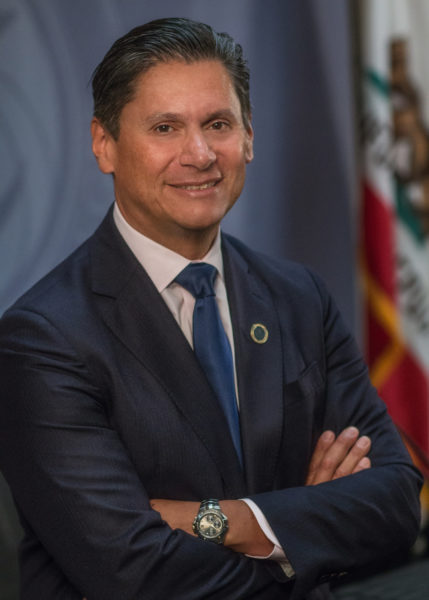The governor and California Community Colleges Chancellor are developing a $120 million 115th, exclusively-online, tuition-free community college. Citrus College trustees worry it could supplant courses that community colleges currently offer.
Paul Feist, community colleges vice-chancellor for communications, said, “We’re not proposing that this new college replace any college’s current online course offerings.”
The chancellor’s office issued a press release Jan. 10 that reads, “The college will develop short-term credential programs aimed at serving the approximately 2.5 million adults in California with some or no college experience who do not have time to enroll in a traditional community college.”It’s terrible in terms of job security.
[perfectpullquote align=”right” cite=”” link=”” color=”” class=”” size=””] “It doesn’t help the students one wit and it will cost the taxpayer twice as much money.” – Citrus College Trustee Edward Ortell [/perfectpullquote]
Numerous concerns have been formally expressed by local college leaders. Superintendent/president of Citrus College, Dr. Geraldine Perri, was one of several trustees voicing serious trepidation at their Jan. 16 meeting.
“When you read the website and see the other chancellors in the state who are in support, I think we wonder what do they know that we don’t know about. We basically feel that could be a threat to all the community colleges in the state,” Perri said.
Several Citrus College trustees and representatives recently returned from the Community College League of California’s Annual Legislative Conference where the proposed digital institution was the hottest discussion topic.
Marilyn Grinsdale, government relations officer for Citrus College, was one of the attendees. “My gosh, there were so many concerns expressed by a variety of constituent groups. It is very much still in a state of debate,” Grinsdale said.
The proposed online campus offering free credentialing programs, already has many detractors among community college administration and faculty. It is sure to be extremely divisive.
Trustee Edward Ortell was among the first to raise concerns about the proposal.
“They just want to come in and scoop up our program and call it their program,” Ortell said. “It’s terrible in terms of job security. It doesn’t help the students one wit and it will cost the taxpayer twice as much money,” Ortell said.
Ortell compared it to a similar proposal he challenged when he worked for the College Trustees State Board of Directors, California Senate Bill 6 of 2006. “They tried it before when they tried to take our part-time classes into a Sacramento-run online college about a decade ago,” Ortell said. “Why create a tremendous bureaucracy in Sacramento you won’t even be able to communicate with?”

Justina Rivadeneyra, Citrus College Faculty Association president, also expressed concern over whether the online college would diminish the local control college trustees and faculty now exercise.
“They wanted faculty input, but it’s almost like, ‘I’m going to hear you, but I don’t have to employ what you want.’” Rivadeneyra said.
Faculty unions are long-time political allies of state politicians, but are beginning to articulate qualified opposition to the governor and chancellor’s proposal.
“They’re not going to have collective bargaining, it’s union busting,” Ortell said, “Collective bargaining is a mainstay of community colleges, otherwise we’d still have child labor.”
Like many campus leaders, Rivadeneyra considers the volume of questions as to how the new college will operate to be enormous. She raises issues of tenure, oversight metrics, online textbook quality and peer review, which have yet to be addressed.
“We’re saying this could be a wonderful idea but we have to ensure the parameters are there so faculty are not taken advantage of,” Rivadeneyra said.
Massive Open Online Courseware, or MOOCs, have already registered 28 million people according to ClassCentral.com. EDx and Coursera are major free online services connected to hundreds of higher educational institutions around the world.
And then there are the colleges themselves offering some of their courses for free. Any student can currently take the first course in Microeconomics developed at MIT through MIT’s pioneering Open Courseware.
Even online courses taught by the most involved professors tend to have inconsistent results according to students.
Yachi Rivas, Student trustee, said ”I took a PE class the semester before last online. I took it on Blackboard and it was really bad,” Rivas said. “Once I took the English 101 on Canvas, it was way different.”
Rivas is not as concerned as some others on the board with what the new online college will teach. “The concern of the trustees who spoke at the conference I just attended (the Community College League of California) was that they were going to take away 25 to 35 year-old students from the traditional schools and they will just do online,” Rivas said.
The chancellor’s office says it will only be offering certificate, not degree programs, possibly in partnership with employers that will offer career skills. “The idea is not to compete with our existing colleges,” Feist said, “We don’t want to cannibalize enrollment. What we’re going after is students who can’t come to our colleges.”
Ortell says he maintains a “healthy skepticism” of the proposal. “That’s another claim that they put in that is bogus, they say, ‘we’ll serve the students that are 25 or older,’ don’t we have those students already?” Ortell said, “They want our money and our classes.”
But the vice-chancellor’s insists their college will be created with the best intentions. “If you’re asking me if there is some sort of a calculation or assumption that this is going to be taking students away from existing community colleges, we don’t agree with that,” Feist said.


